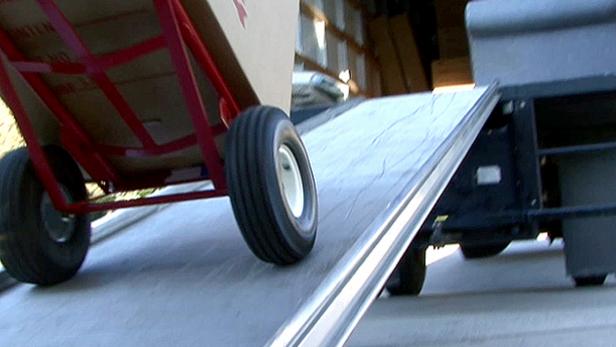Top 10 Ways to Cut Moving Costs
If you're moving into a new home, your pockets probably feel pretty empty right now. You've just paid a down payment, closing costs and broker fees, so the last thing you want is an expensive move. Lucky for you, we've got tips to help you pack up and ship out on a budget.

- If you don't need it, don't pay to move it.
Movers base their prices on what you're shipping, so cutting down on clutter will simplify your life and lighten up the load in the moving truck. We're talking to you, the owner of the treadmill-turned-drying-rack. You can sell what you don't need or donate it to charity.
- If possible, schedule your relocation after peak moving season.
Most people choose to move in the summer months, when the kids are out of school. The least expensive time of the year to move is between October and April, so if it's possible to postpone your move, you could save some money.
- Get at least three in-home estimates.
If you're hiring a professional mover to do the heavy lifting and packing, prices can vary widely between companies. To make sure you're getting the best deal possible, get at least three estimates.
- Don’t get scammed by a rogue mover.
You'll be loading up all your worldly possessions and putting them on a truck with a few workers you barely know. Protect yourself! Look for red flags and get recommendations from friends and neighbors to avoid getting scammed.
- Use what you have for packing, and then buy your own supplies.
Moving companies often charge hefty fees for packing supplies. Save money by filling up containers you already have, like suitcases or plastic bins. Use sheets and linens to wrap items. Buy the packing materials you still need from a recycled box company, or get them free from a local business.
- Ask questions to unearth hidden moving costs.
Even legitimate movers might not spill all the costs unless you ask. To get an accurate picture of your total, ask if they'll charge for heavy items, repacking, stairs or waiting.
- Get portable storage and delivery.
Companies like PODS and 1-800-PACKRAT will deliver a storage unit to your door. You'll save money packing it yourself, and they'll pick it up and deliver it to your new digs.
- Rent a truck for a totally DIY move.
Renting a truck and doing it yourself is the most cost-effective way to move. Enlist your friends and family for packing, and read the fine print for mileage allowances and fuel surcharges.
- Get moving insurance.
Even the best movers have one potential pitfall: They're human. If you do wind up with a lost or damaged item, you'll likely need more than the measly 60-cent-per-pound coverage that comes free to replace it.
- Deduct your moving expenses from your taxes.
Don't forget to save those receipts -- you can also save money after the big move! If you relocated for a new full-time job at least 50 miles away from your previous home, you can deduct the cost of packing, transporting or storing your household goods from next year's tax return.
Next Up
HGTV's Top 10 Ways to Beat the Sluggish Housing Market
Don't let the slow market get you down. Whether you're a home seller looking for offers or a homebuyer facing stricter loan requirements, rev up your real estate potential with these helpful tips.
Top 10 Time-Saving Tips for Your Move
Use these pointers to make your next move fast, efficient and hassle-free.
Guide to Buying a Second Home or Vacation Home
Follow these five steps to guide you through the process of buying a second home.
Get an Agent or Sell Yourself?
Many people try to sell their own house. Here's what you need to know if you go that route.
Getting a Mortgage Loan: Pre-Approved, Then Not Approved
When one client is pre-approved for a mortgage, and then not approved during escrow, real estate expert Tara-Nicholle Nelson has a few solutions up her sleeve.
Get Pre-Approval on Your Mortgage Application
Pre-approved loans are the way to go in today's real estate market.
Guide to Mortgage Assumptions
Is a mortgage assumption a smart choice for you? Here, learn everything you need to know.
Getting a Property Tax Reassessment Due to a Decline in a Home's Market Value
Why pay for a service when you can do it yourself?
Get My Agent on the Phone
Especially for first-time homebuyers, using a seasoned agent is a smart move.
Get a Bargain on a Stigmatized Property
You can find a bargain in just about every neighborhood these days, but if you’re looking for a deal with a price that’s been “slashed,” try searching for the home where the “slasher” lived.














































